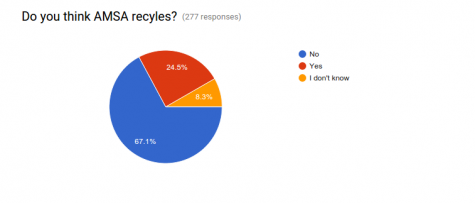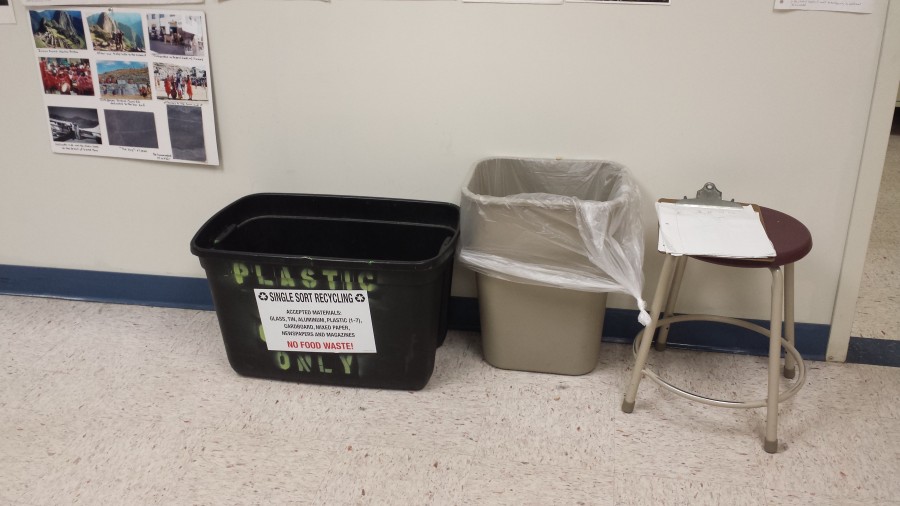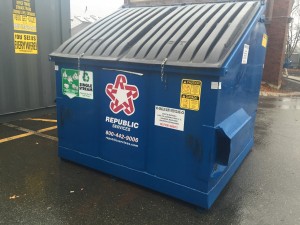Breaking down the Great Recycling Myth
Even new labels attached to recycling bins have not cleared up rumors that the school fails to recycle.
AMSA may recycle, but does it matter if the majority of people on campus don’t know?
It’s rather telling when teachers and administration have two different stories. Many teachers who were interviewed replied confidently that AMSA did not recycle. Science teacher Kelly Antonuccio was one of those teachers, and stated the school used to recycle but had stopped long ago because it had gotten too expensive.
Even some administrators shared this view, with Substitution Manager Sheila Warner going so far as to say she regularly takes her recycling home because she knows AMSA does not recycle. Even our current principal, Dr. Michael Curry, wasn’t sure that AMSA recycles.
“I know that AMSA does not recycle,” he said. “I don’t think we are recycling.”
Students seem to have bought into this myth, too, which isn’t surprising considering their sources. In a survey I conducted online with 277 AMSA student respondents, 67 percent of them said that they believed AMSA did not recycle. Out of that 67 percent, two-thirds of people who said AMSA did not recycle said they got their information from teachers.
Unfortunately for the majority of people surveyed, they couldn’t be farther from the truth.
Sean Kessler, a member of the facilities management team at AMSA, set the facts straight, saying simply: “Yes, we do recycle.” Mr. Kessler elaborated by saying that not only does AMSA recycle, but it has been doing so for a number of years.
Why is it so hard to figure out if AMSA recycles or not? There was no single idea among administrators, teachers, or students about recycling here at AMSA and yet all were adamant that AMSA doesn’t recycle. Where does the misconception come from?

Well, for starters, let’s review the history of recycling at AMSA. The first company AMSA contracted in 2010 to pick up its recycling ended up being rather expensive, so AMSA looked for an alternative. In 2011, KLT Industries offered to do it for free and AMSA’s recycling program was saved—until this year. KLT Industries started to ask for payment for recycling, so AMSA had to search for another recycling option.
This may be where the misconception arose; since AMSA had used KLT Industries for around four years, the sudden split may have left teachers and administration out of the loop. AMSA eventually found a free program with Allied Waste Services and resumed the program, at which point the AMSA populace should have been notified of the recycling program’s return.
It’s reasonable for students to assume that AMSA doesn’t recycle because they had never been told otherwise. Rumors spread easily among the student populace, and as my survey showed, 61 percent of students who said there was no recycling program said they reached their conclusion via rumor.
It’s not reasonable for teachers and administration to be confused regarding AMSA’s policy towards recycling. This miscommunication, or lack of communication, can’t become the norm. Not only is it unfair to teachers, who deserve to know what’s going on in the school, but it can also create real problems in AMSA’s overall attitude towards recycling.
In another online survey I conducted, this time limited to high schoolers, 82 percent of people interviewed who said AMSA didn’t recycle reported that they have thrown recycling into the trash. Nearly 30 percent of those people also said that they throw recyclables into the trash almost all the time.
Of the people who said that AMSA didn’t recycle and that they throw recyclables into the trash, half of them felt it wasn’t that big a deal because they thought AMSA didn’t recycle.
AMSA is actually undermining the recycling effort by having such an unclear (unknown?) recycling policy. Students are routinely ignoring recycling bins and throwing recycling in the trash, all because of this communication error.
Teachers have inadvertently supported this problem by misinforming students about the recycling program. Recycling is one way schools can reduce their waste output and this communication error has caused AMSA to be part of the problem rather than a part of the solution.
Re-labeling the recycling bins isn’t enough. Administration has to have transparency when it comes to the recycling program, and an email distributed to students and faculty alike detailing the recycling program would be a great way to accomplish this.
It’s crucial for the administration to outline AMSA’s policy towards recycling and clear up any misconceptions AMSA students and faculty may have, as well as work to prevent any miscommunication in the future.

Alyana has always had a passion for keeping up with current events, sharing her opinions and mindset, and contributing to a group effort. Her twin sister...


